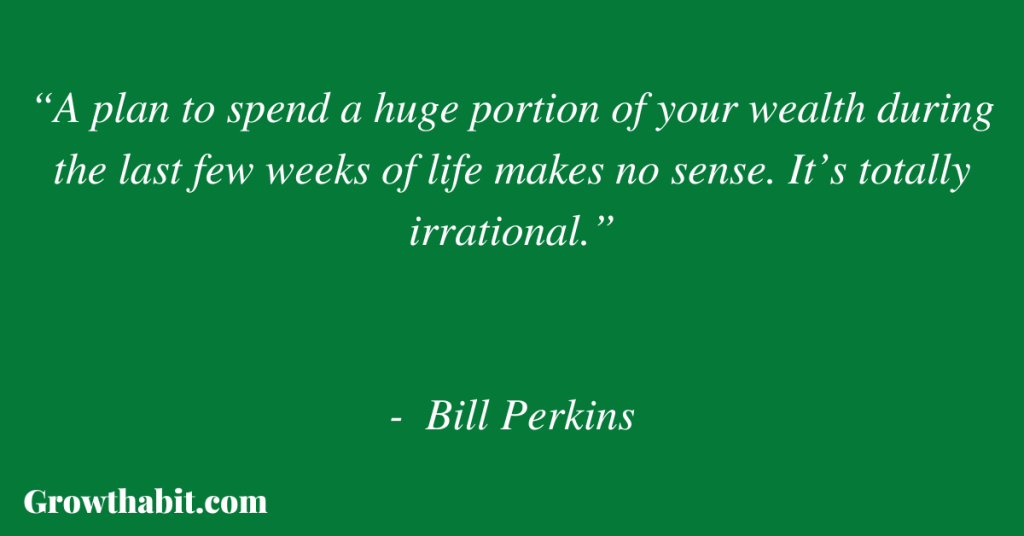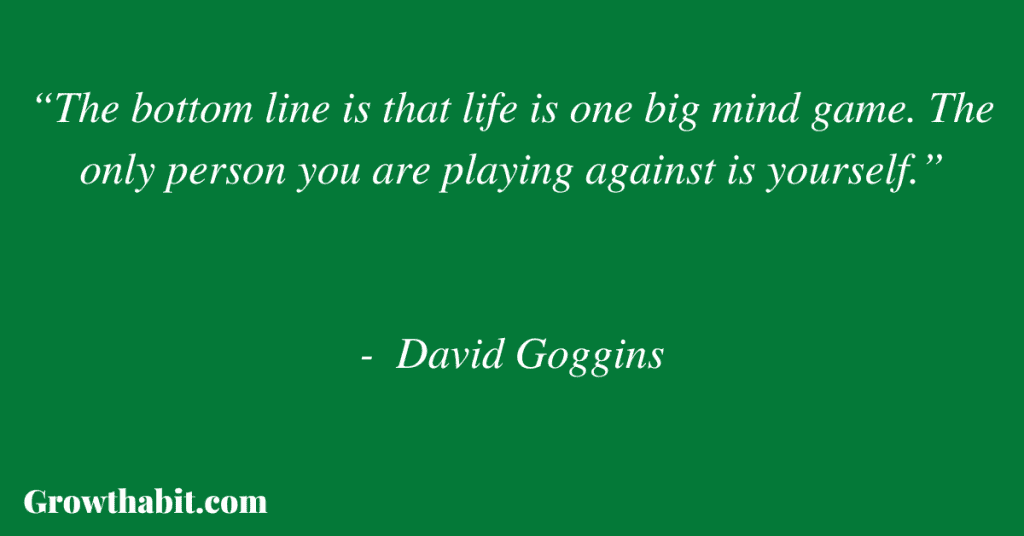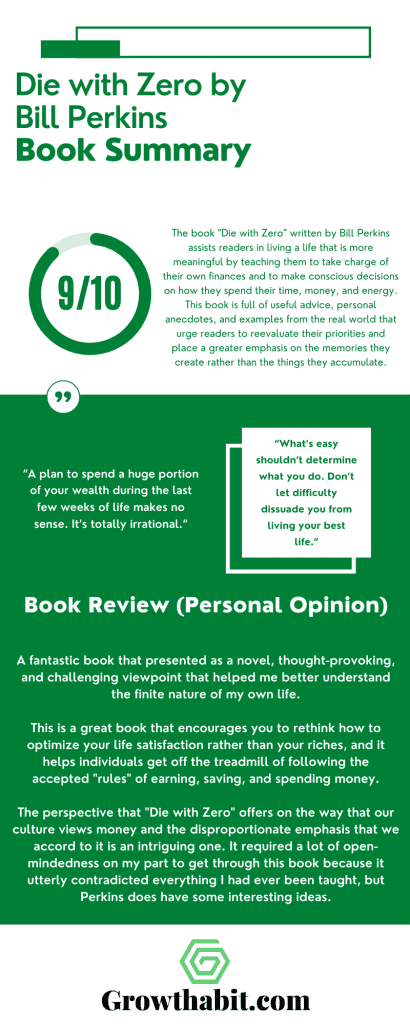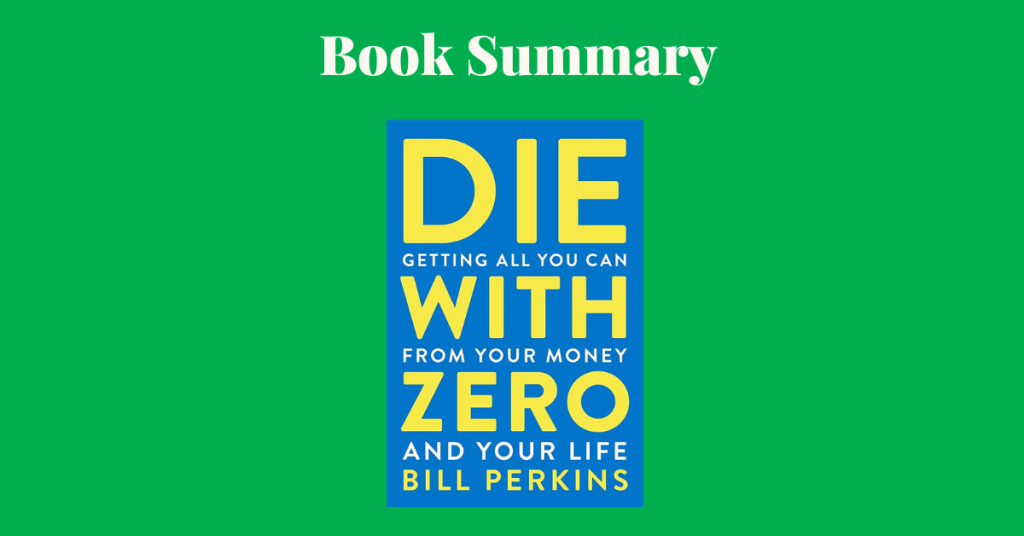The book “Die with Zero” written by Bill Perkins assists readers in living a life that is more meaningful by teaching them to take charge of their own finances and to make conscious decisions on how they spend their time, money, and energy. This book is full of useful advice, personal anecdotes, and examples from the real world that urge readers to reevaluate their priorities and place a greater emphasis on the memories they create rather than the things they accumulate.
It forces you to take account of your health and financial well-being at different points in your life and teaches you to set realistic goals so that you can enjoy the rewards of your efforts without suffering emotional or mental distress.
Book Title— Die with Zero
Author— Bill Perkins
Date of Reading— April 2023
Rating— 9/10
What Is Being Said in Detail
CHAPTER 1. Optimize Your Life
What are the things that truly matter in life? The majority of people are not motivated by money but rather by the joy they get from spending time with their loved ones. Relationships are more important than material things.
Because of this, it is important, according to Perkins, to avoid delaying for an excessive amount of time activities that bring you joy. According to him, the worth of one’s life experiences rises with the passage of time and results in “memory dividends.”
To live a fulfilled life, Die with Zero suggests that we live with more urgency, to be more intentional about how we use our time to create memories today, right now, before it becomes too late. The first step in optimizing your time is to identify your priorities. And then prioritize your time with them.
CHAPTER 2. Invest in Experiences
Numerous psychology studies have demonstrated that investing money in experiences, as opposed to material possessions, leads to greater levels of happiness. In contrast to the initial excitement that comes with acquiring a new material property, which is usually followed by a rapid decline in value, the worth of experiences actually increases with time; I refer to this as a “memory dividend.”
The whole total of the activities you accomplish on a daily, weekly, monthly, and yearly basis constitutes what makes you who you are. When you look back on your life, the quality of your life will be determined by the depth of the experiences you’ve had.
Perkins recommends that you take some time to think about your prior experiences and select the ones that have left the greatest impression on you and have stayed with you the longest. When you have a crystal-clear grasp of the kinds of experiences that bring you the most joy, you will be able to ensure that you give those experiences a high place of importance in your life and devote time, resources, and effort to bringing you more of those kinds of moments.
CHAPTER 3. Why Die with Zero?
According to Perkins, if you devote your whole life to accumulating wealth but pass away without having spent any of it, you will have pointlessly squandered a large portion of your time spent working for it.
When you’re young, you shouldn’t put as much emphasis on making money as you should on gaining valuable experiences, since your potential for making money will almost certainly improve as you get older, which means that the amount of money you make in a given amount of time will be greater.

Researchers polled people of varying ages to find out the factors that prohibited them from going on vacation. They discovered that those under the age of 60 were most restricted by time and money, whilst those beyond the age of 75 were most restricted by health issues.
Perkins’ suggestion is to work toward the goal of passing away with no assets, after having spent money on one’s own experiences, providing for one’s family, and leaving behind a legacy in which one’s wealth is not one’s legacy.
CHAPTER 4. How To Spend Your Money (Without Actually Hitting Zero Before You Die)
According to Perkins, if you have no idea when you will pass away, you can’t be expected to make the best decisions for your life. It is to your advantage to make use of resources such as a life expectancy calculator in order to put yourself in a situation where you will not run out of money during retirement. Because if you are the sort of person who tends to be overly cautious, you run the risk of spending your whole life working jobs that you despise in order to accumulate wealth that you will never appreciate.
Finding a happy medium between spending money in the here and now (but only on things that hold worth for you) and saving money wisely for the future is essential.
It’s not all that difficult to devise a strategy to end up with a score of zero.
First, you should determine the furthest age that you might possibly live to, and then you should calculate how much money you will require. It is important to keep in mind that as you become older, the majority of your costs, with the exception of those related to your health, will become much more manageable and can be paid for using a mix of annuities, insurance, savings, and an emergency fund.
CHAPTER 5. What About the Kids?
When Perkins tells us about living our greatest life and dying with nothing, he is referring to spending all of our money and having nothing left over at the end of our lives. Certainly not the kids. When our children are in the greatest need of our assistance, Jesus urges us to give them the portion that is rightfully theirs. Not when we pass away, for maximum effect on their life as well as ours.
It is natural for you to want to leave an impression on your children so that they will remember you. Both of your sets of memories will provide a memory dividend: one stream of dividends for you, and one stream of dividends for your children. The question is, how do you want your children to remember you?
Your children will only get to experience childhood for a certain number of years. Which kinds of adventures do you hope to share with them? Or, to rephrase the question, what kinds of interactions do you want to have with them?
Ask yourself: Is it really worth it for you and your children if you put in that extra hour of work every day? Does your effort leave a legacy that is greater than it was before, or does it really help to diminish it?
CHAPTER 6. Balance Your Life
Perkins is certain in his belief that one’s ability to get happiness from their financial situation tends to deteriorate with advancing age. Therefore, the advice that he gives to individuals is to make the most of their time and money in order to get the most out of life and to avoid the trap of living life on autopilot as much as possible.
When it comes to matters of personal money and striking a balance between conflicting needs, there is no one rule that applies to all. Do not spend your life on autopilot; rather, be ready to make consistent, individualized adjustments.
CHAPTER 7. Start to Time-Bucket Your Life
In this chapter, Perkins states that putting together a “bucket list” of activities and adventures that you wish to undertake in your lifetime is another essential step in living a life that is more meaningful to you. This could involve things like going to a different nation, gaining a new talent, or accomplishing a personal objective. Instead of putting off crossing things off your bucket list until retirement or some other arbitrary time in the future, Perkins recommends that you get a head start and begin crossing off items as soon as feasible.
This rule makes reference to the idea of “time buckets,” which holds that different experiences have different optimal ages at which to have them. Determine what your life would be like at each of those stages, and then think about when you’d like to fulfill each of your goals throughout the course of your lifetime.
CHAPTER 8. Know Your Peak
According to Perkins, many of us put off enjoyment and continue working hard each day so that we can put money away for the future. The only danger we face is discovering that we may have postponed it for an inordinate amount of time.
When you work, you expend some of the limited amount of life energy that you have available since life energy is equal to the whole number of hours that you are alive and able to engage in activities. Therefore, the quantity of money that you have gained as a result of your hard work is equivalent to the amount of life energy that you used in order to obtain that money.
If you pass away with additional money, it indicates that you worked extra hours throughout your life to earn that money, which, in essence, implies that you have thrown away those extra hours of your life. It means that there is an ideal quantity of work (to turn time into money) that you will need to perform in order to live the lifestyle that you want, but that doing any more than that is unnecessary. On the other hand, people have a propensity to labor and save far more than is required, typically out of habit or fear.
For some individuals, it is simpler to continue doing what they have been doing, particularly when what they have been doing continues to reward them with money, which is the universal kind of appreciation that society gives for a job well done. As soon as you get into the routine of working for money to support yourself, the excitement of generating money becomes greater than the excitement of actually living.
Perkins suggests locating the optimal point in time when your resources are at their highest, after which you should begin spending money in order to derive the most amount of pleasure and satisfaction.
CHAPTER 9. Be Bold – Not Foolish
According to Perkins, the average person is more concerned about running out of money than about wasting their life, and this way of thinking needs to be altered. Your first concern ought to be not how much money you’ll have left over at the end of your life but rather whether or not you’ll have wasted your life.

Readers are encouraged by Perkins to embrace the sensation of “embarrassment” that frequently accompanies the attempt at anything new or unexplored. People may open themselves up to new experiences and possibilities in their lives if they are prepared to take risks and attempt new things. This will allow them to seize new experiences and opportunities that they would not have had otherwise.
In addition, the younger you are, the greater proportion of chances you ought to be taking. You won’t be able to pursue the possibilities that require a little bit of risk when you’re older, so you should take advantage of them while you can.
Most Important Keywords, Sentences, Quotes
CHAPTER 1. Optimize Your Life
“In other words, to get the most out of your time and money, timing matters. So, to increase your overall lifetime fulfillment, it’s important to have each experience at the right age.”
CHAPTER 2. Invest in Experiences
“Although we all have at least the potential to make more money in the future, we can never go back and recapture time that is now gone. So, it makes no sense to let opportunities pass us by for fear of squandering our money. Squandering our lives should be a much greater worry.”
“Nothing has a greater effect on your ability to enjoy experiences—at any age—than your health. In fact, health is actually a lot more valuable than money, because no amount of money can ever make up for very poor health—whereas people in good health but with little money can still have many wonderful experiences.”
CHAPTER 3. Why Die with Zero?
“You might think that as people get older, they spend money more freely out of the sheer desire to make the most of it before it’s truly too late. But the opposite tends to happen. In general, spending among American households declines as people age.”
CHAPTER 4. How To Spend Your Money (Without Actually Hitting Zero Before You Die)
“Another principle: Although we all have at least the potential to make more money in the future, we can never go back and recapture time that is now gone. So, it makes no sense to let opportunities pass us by for fear of squandering our money. Squandering our lives should be a much greater worry.”
CHAPTER 5. What About the Kids?
“First of all, yes, you can certainly leave money to the people and causes you care about—but the truth is that those people and causes would be better off getting your wealth sooner rather than later. Why wait until after you die?”
“So many people tell themselves that they are working for their kids — they just blindly assume that earning more money will benefit their kids. But until you stop to think about the numbers, you can’t know whether sacrificing your time to earn more money will result in a net benefit for your children.”
CHAPTER 6. Balance Your Life
“A plan to spend a huge portion of your wealth during the last few weeks of life makes no sense. It’s totally irrational.”
CHAPTER 7. Start to Time-Bucket Your Life
“We all have at least the potential to make more money in the future, we can never go back and recapture time that is now gone. So, it makes no sense to let opportunities pass us by for fear of squandering our money. Squandering our lives should be a much greater worry.”
CHAPTER 8. Know Your Peak
“What’s easy shouldn’t determine what you do. Don’t let difficulty dissuade you from living your best life.”
CHAPTER 8. Be Bold – Not Foolish
“The upside of taking a chance always includes emotional benefits—even if things don’t work out. There’s a great sense of pride at having pursued an important goal wholeheartedly. If you’ve given something your all, you’ll get a lot of positive memories out of the experience no matter what happens.”
CONCLUSION. An Impossible Task, a Worthy Goal
“Chase memorable life experiences, give money to your kids when they can best use it, donate money to charity while you’re still alive. That’s the way to live life. Remember: In the end, the business of life is the acquisition of memories. So, what are you waiting for?”
Book Review (Personal Opinion):
A fantastic book that presented as a novel, thought-provoking, and challenging viewpoint that helped me better understand the finite nature of my own life.
This is a great book that encourages you to rethink how to optimize your life satisfaction rather than your riches, and it helps individuals get off the treadmill of following the accepted “rules” of earning, saving, and spending money.
The perspective that “Die with Zero” offers on the way that our culture views money and the disproportionate emphasis that we accord to it is an intriguing one. It required a lot of open-mindedness on my part to get through this book because it utterly contradicted everything I had ever been taught, but Perkins does have some interesting ideas.
This Book Is For:
- People who want to make a change in their lives and are not afraid of jumping to something unknown.
- People who want to optimize their time, experience and money on the best way to enjoy their lives.
If You Want to Learn More
Here is an interview with author Bill Perkins where he shares a methodology shared in his book. 237 ‒ Optimizing life for maximum fulfillment | Bill Perkins.
How I’ve Implemented the Ideas from The Book
One of the chapters that stuck with me the most was the time-bucket technique. I’ve realized that I waste so much time on social media. That’s why is that I’ve been setting limits on my social media use. Now, instead of checking them put constantly during the day, I’ve set just two certain hours to allow me to check on them. That has helped me stayed focus on my life and much more important priorities.
And the conclusion made me rethink some decisions I was making in my life. For example, I could invest my money in a new business. It was a scary choice, and I had a lot of questions and fears as I went along. In spite of the difficulties, I overcame them and established a thriving business, which has given me not just fulfillment but also meaning in life.
One Small Actionable Step You Can Do
There is always space to improve and expand one’s knowledge, regardless of where one is on their trip or how long they have been traveling along this road. The first thing you should do is begin to reflect on what you consider to be essential in your life and conduct an introspective analysis of how you spend or “waste” your time on a daily basis, in addition to how you allocate resources, such as time and money. When you do this, you’re able to become aware of the things that it is possible that you would like to alter, and you can then begin the journey by following the stages that Perkins has previously given in the book.

